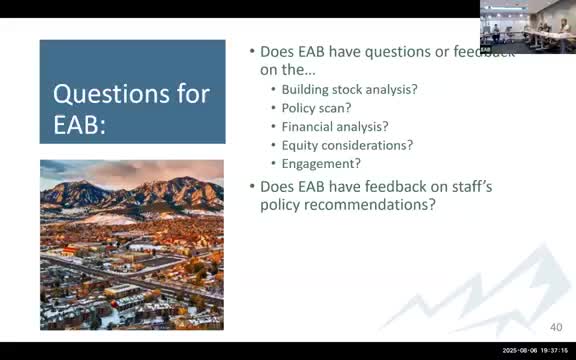Boulder Council Discusses Impact of Green Regulations on Low-Income Renters
August 08, 2025 | Boulder, Boulder County, Colorado
Thanks to Scribe from Workplace AI , all articles about Colorado are free for you to enjoy throughout 2025!

This article was created by AI using a video recording of the meeting. It summarizes the key points discussed, but for full details and context, please refer to the video of the full meeting. Link to Full Meeting
One board member raised a critical question about the potential financial impact of these environmental policies. "Is there any analysis on costs passed along to consumers?" they asked, highlighting concerns that businesses might increase prices to cover the expenses of compliance with new green standards. This sentiment resonated throughout the room, as members acknowledged the challenge of ensuring that sustainability efforts do not disproportionately affect those already struggling financially.
The conversation shifted to the implications of tariffs and market fluctuations, which could further strain low-income households. "If a company that manufactures or sells in Boulder raises prices, we can't stop that," another member noted, emphasizing the need for awareness and proactive measures. The board discussed the importance of transparency in how these costs are communicated to the public, particularly through initiatives like the "green score" for buildings, which aims to inform consumers about the environmental performance of their spaces.
Despite the challenges, the board expressed a commitment to finding solutions. They discussed the implementation of "smart regulations" that require commercial properties to amortize costs, a step towards mitigating the financial burden on consumers. However, the limitations imposed by state statutes on rent control for residential properties left some members feeling constrained in their ability to protect vulnerable populations.
As the meeting drew to a close, the board recognized the necessity of deeper engagement with the community to address these complex issues. "It's a very real conversation," one member stated, underscoring the importance of balancing environmental goals with economic equity. The discussions at this meeting not only highlighted the challenges ahead but also the city's dedication to fostering a sustainable and inclusive future for all its residents.
Converted from 8-6-25 Environmental Advisory Board Meeting meeting on August 08, 2025
Link to Full Meeting
Comments
View full meeting
This article is based on a recent meeting—watch the full video and explore the complete transcript for deeper insights into the discussion.
View full meeting
